Have you been wondering whether peanut butter, specifically natural peanut butter, is a healthy choice for children with tummy troubles like irritable bowel syndrome (IBS)?
Today, we’ll dive into this common household favourite in the context of gut health and IBS.
We’ll examine whether this beloved spread should be a part of your child’s low FODMAP diet.
Let’s delve into the world of IBS symptoms, low FODMAP foods, and peanut butter.
Can Peanut Butter Trigger IBS?
Let’s dive into this question that might be worrying IBS sufferers with abdominal pain.
Peanut butter – it’s more than just a spread; it’s a creamy, delightful part of many childhoods.
But when it comes to IBS, does this favourite play nice?
Think of every food your child tries, like consuming peanut butter, as a little experiment in discovering their path to feeling great.
When peanut butter gets a thumbs-up from their tummy, celebrate it!
It’s not just tasty; it’s packed with protein and fibre that nurtures the ‘good bacteria’ in the gut, supporting your child’s immune system in its superhero duties.
Here’s more good news: peanuts typically don’t contain those pesky ingredients known for causing tummy troubles like added sugars or fructose corn syrup.
But, if you find that your little one’s IBS flares up after a peanut butter feast, play detective a bit.
What else was on the menu?
Sometimes, it’s the hidden high FODMAP ingredients in other foods that are the real culprits.
If peanut butter turns out to be a no-go, don’t fret. Try a smaller portion size next time.
You’ve just gained invaluable insights in your quest for their health and happiness.
Every observation, every little tweak in their diet, is a step forward in understanding what makes your child’s body feel its best.
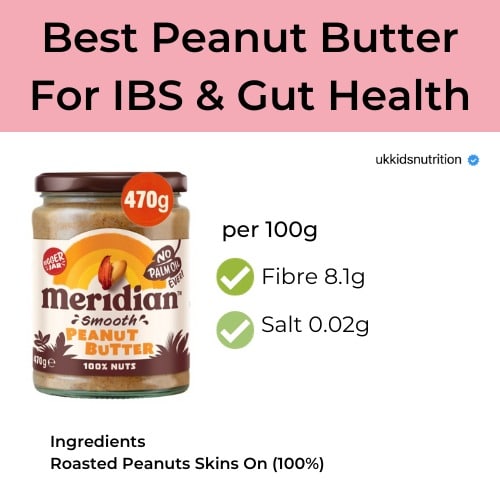
#1 Meridian Peanut Butter
The Nutritional Profile of Peanut Butter
Peanut butter’s nutritional value is undeniable.
It’s a good source of protein, healthy fats, and other essential nutrients.
However, the choice of peanut butter is crucial – opt for natural and unprocessed varieties to ensure your child is consuming peanut butter that’s free from unnecessary additives that may be added to certain foods.
You will then be providing wholesome, nutritious food for your child, ensuring they receive the best, most beneficial ingredients.
Are There Any Health Benefits of Eating Peanuts for Children?
Peanuts truly are tiny powerhouses of joy and nutrition.
They come packed with a cocktail of health benefits, making them a fantastic low FODMAP snack.
You can also use them to make tasty peanut butter cookies as a weekend activity with the kids.
And here’s why. First off, they’re a brilliant source of plant protein.
This isn’t just any protein – it’s the kind that helps build muscles and fuels growth, turning your little ones into strong and healthy individuals.
The healthy fats in peanuts – a mix of mono and polyunsaturated fats – are like a loving hug for their heart, supporting cardiovascular health.
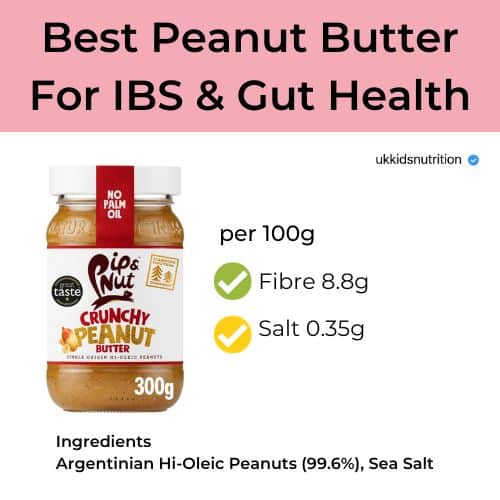
#2 Pip & Nut Peanut Butter
How Does Peanut Butter Improve Gut Health?
Peanut butter can be a real game-changer when it comes to nurturing your child’s gut health.
The fibre in peanut butter is like a gentle, yet effective, conductor in the orchestra of digestion.
It helps keep everything regular and moving smoothly, playing a crucial role in preventing constipation and maintaining healthy stool consistency. But that’s not all – this fibre isn’t just a one-trick pony.
It’s also food for the beneficial bacteria living in the gut, aided by digestive enzymes.
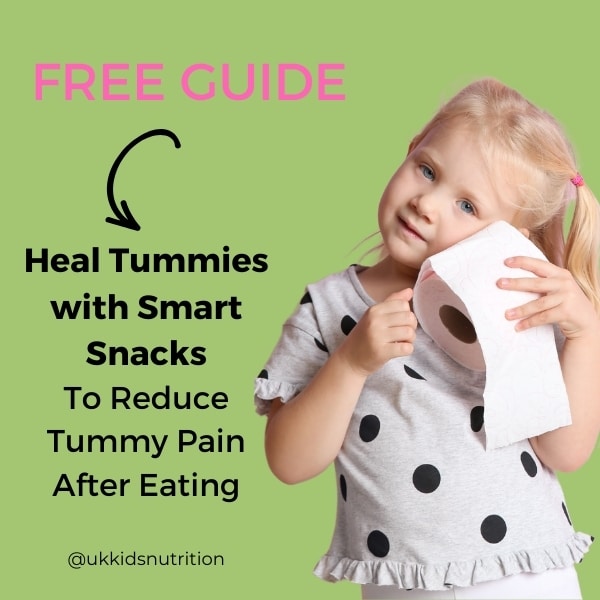
Is Peanut Butter Low FODMAP?
Stepping into the world of managing IBS, especially for our growing children and teens, often leads us to the question: Is peanut butter low in FODMAP?
The answer is a resounding yes, and this is fantastic news!
Peanut butter is not just low FODMAP; it’s also a plant-based powerhouse, making it an excellent addition to your child’s diet.
Why? Because it’s packed with calories essential for their growth and energy. This creamy (or crunchy, if that’s their thing) delight is incredibly versatile.
Imagine spreading a layer of peanut butter on gluten free toast or rice cakes, or making oat-based peanut butter cookies – it’s like adding a magic touch to a simple snack, transforming it into a nutritious and tummy-friendly treat.
And for those cosy mornings, stirring peanut butter into a hot bowl of porridge not only adds a burst of flavour but also infuses the meal with all the goodness that peanut butter has to offer.
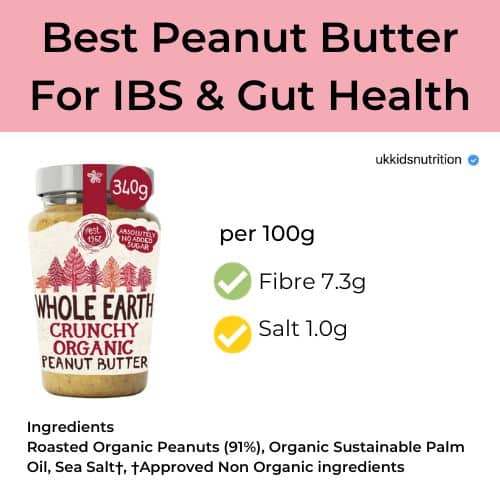
#3 Whole Earth Crunchy Peanut Butter
Other Nut Butters & Seed Butter
Are Hazelnuts Low FODMAP?
When exploring the world of nut butter for a child-modified low FODMAP diet trial, hazelnuts often come into question.
Good news for hazelnut fans: in small servings, hazelnuts are indeed low FODMAP.
They can be a delightful addition to your child’s diet, offering both variety and nutritional value.
However, moderation is key, as larger servings may trigger symptoms. Hazelnut butter can be a tasty and gut-friendly option, just remember to keep an eye on portion sizes.
Almond Butter and Low FODMAP Diets
Almond butter, known for its creamy texture and rich, nutty flavour, is a fantastic choice for those on a low FODMAP diet.
It’s a nutritious option, packed with healthy fats and proteins, ideal for the growth and development of children.
Almond butter is low FODMAP in small servings, making it a tummy-friendly option for your child’s diet.
Remember, moderation is key to avoiding triggering IBS symptoms.
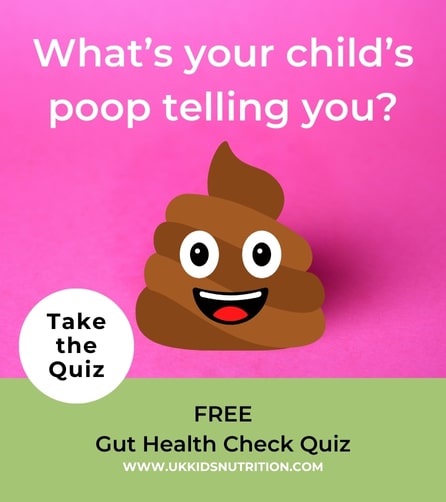
Cashew Nut Butter in the Kid’s Modified Low FODMAP Diet Trial
Cashew nut butter, while creamy, flavourful and boasting healthy fats, is high in FODMAPs.
This makes it a less suitable option for children undergoing a trial of the modified low FODMAP diet.
On the flip side, if your child tolerates cashews well, cashew nut butter can be a nutritious addition to their diet, offering beneficial fats and proteins.
Always work closely with your paediatric dietitian and monitor portion sizes to maintain gut health.
Sunflower Seed Butter: A Low FODMAP Alternative
Sunflower seed butter emerges as a star in the low FODMAP diet, especially for children who need to avoid certain nuts.
Rich in fibre, vitamin E, and antioxidants, it supports healthy skin, boosts immune function, and promotes heart health.
Sunflower seed butter is a fantastic low FODMAP food, adding diversity to your child’s diet while being gentle on their digestive system.
It’s a great alternative for those who love peanut butter but need to explore other options.
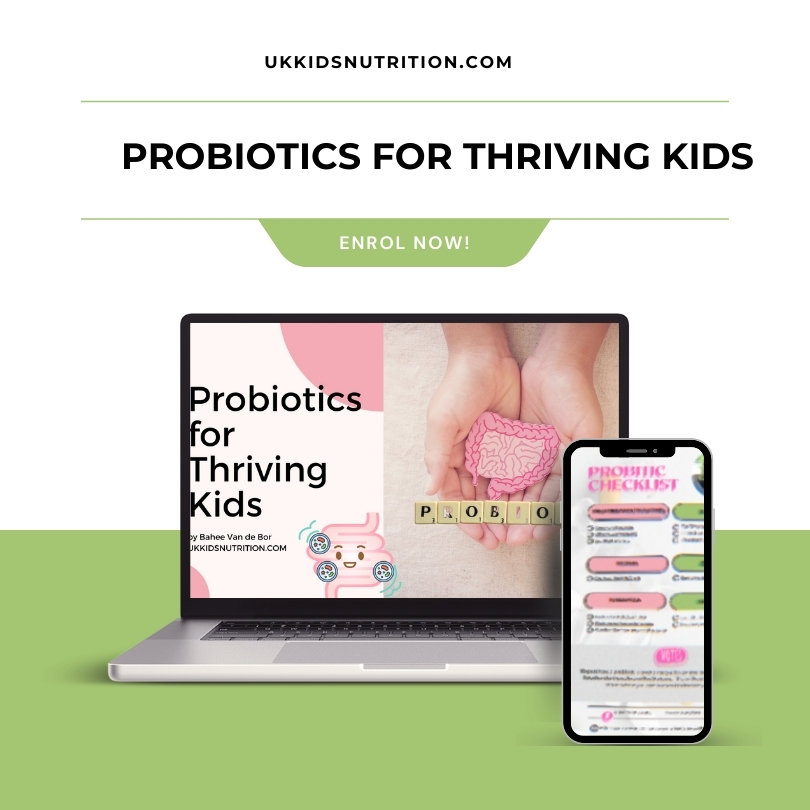
Bottomline
In managing your child’s IBS, exploring different nuts and seed butter can be a delicious adventure.
Each type offers unique flavours and nutritional benefits, making them a joyful part of your child’s dietary journey.
Whether it’s the classic peanut butter, the creamy almond butter, or the nutritious sunflower seed butter, these spreads can bring health and happiness to your child’s diet.
By choosing the right butter and keeping an eye on serving sizes, you can help manage IBS symptoms while providing a variety of tasty, nutrient-rich foods.

Let Me Help
If you’re seeking more personalised guidance or in-depth information, consider exploring my specialized programs and resources:
- Online Course: “Happy Belly BluePrint” – This comprehensive course offers detailed strategies and insights to alleviate constipation and related discomfort in children.
- 1-2-1 Programme: “Happy Belly Club” – Tailored for individual needs, this program provides one-on-one support to master the challenges of gut health and IBS in kids.
- FREE Guide: Don’t miss out on the valuable insights in “Heal Tummies With Smart Snacks”. Download this free guide to start making positive changes today.
- CHAT With Bahee: Book a free initial consultation to discuss the Happy Belly Club.
Each of these resources is designed to empower you with the knowledge you need to support your child’s gut health.
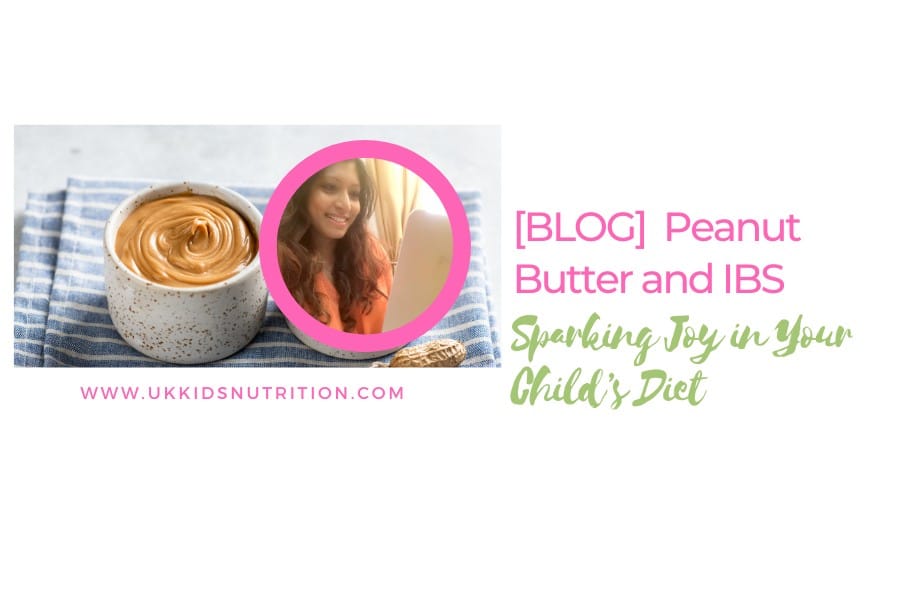
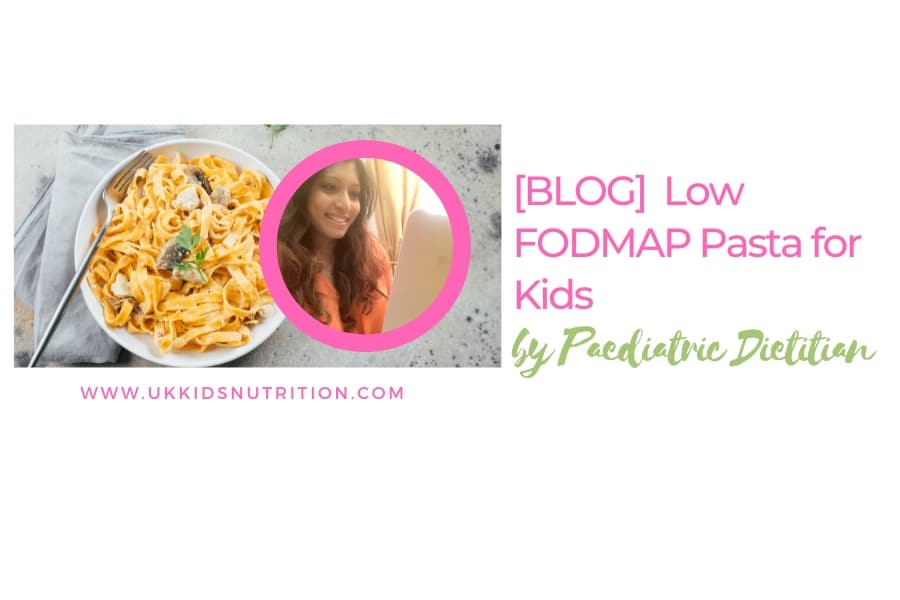
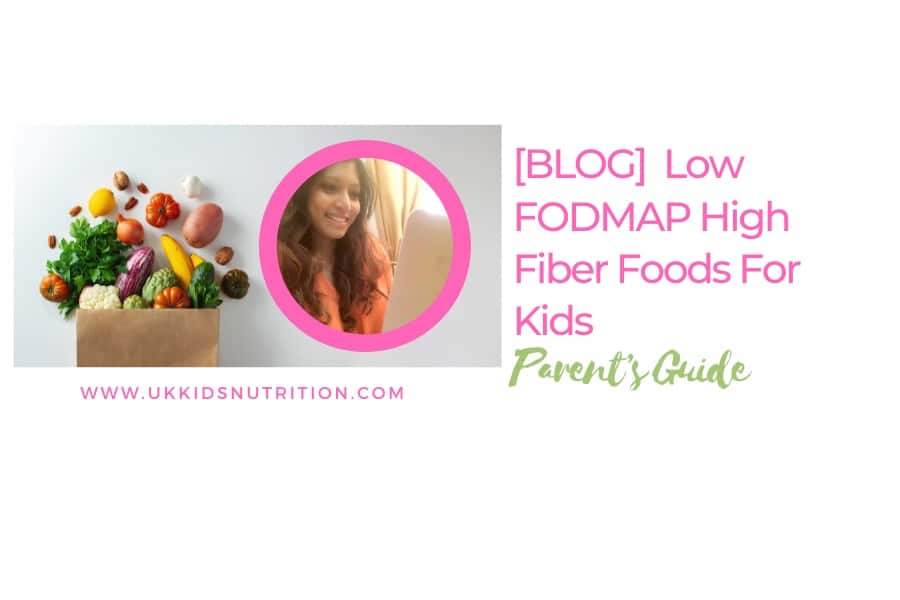
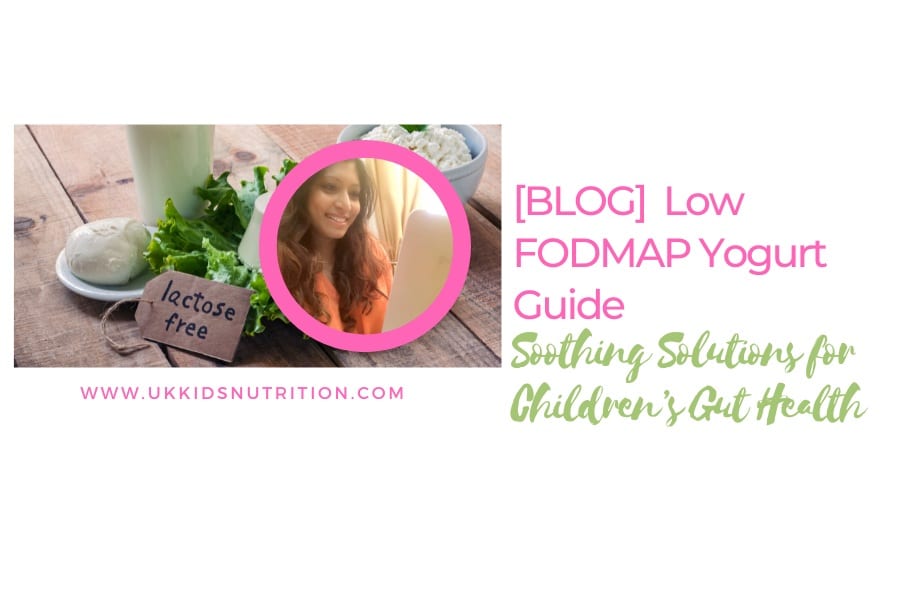
One thought on “Peanut Butter and IBS: Sparking Joy in Your Child’s Diet”
Thank you for sharing a thoughtful guide. We love peanut butter, so I learn how to do it independently. As a mom, I always wanted our kids to be healthy, so we must ensure that their food does not contain too many preservatives.